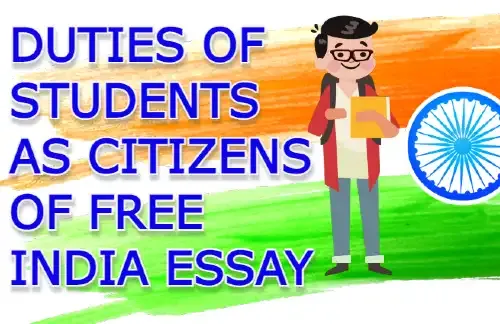Duties Of Students As Citizens Of Free India Essay
Introduction:
In the tapestry of a democratic and free India, the role of students is integral to the nation's progress and prosperity. As the torchbearers of the future, students hold a unique position as both beneficiaries and contributors to the democratic ethos of the country. This essay delves into the duties of students as citizens of free India, exploring how their actions and responsibilities shape the trajectory of the nation's development, emphasizing the critical role they play in upholding the principles of democracy, justice, and social harmony.
Commitment to Education:
The foremost duty of students in free India is to recognize education as not just a personal endeavor but a powerful tool for societal transformation. By dedicating themselves to academic excellence, students equip themselves to become informed and enlightened citizens capable of contributing meaningfully to the nation's progress. In cultivating a commitment to education, students lay the foundation for a knowledgeable and empowered citizenry.
Active Civic Engagement:
Students must actively engage in civic affairs to understand the functioning of democracy and their role as responsible citizens. This involves staying informed about current events, understanding the democratic process, and participating in activities that promote civic responsibility. By exercising their right to vote responsibly and engaging in constructive civic discourse, students contribute to the vibrancy and health of the democratic system.
Cultural and Social Sensitivity:
India's strength lies in its rich cultural diversity. Students have a duty to foster unity and harmony among diverse communities by respecting and appreciating different cultures, religions, and languages. Cultural sensitivity and social awareness are critical for building a cohesive society, and students can actively participate in cultural exchange programs and initiatives that promote intercultural understanding.
Social Responsibility through Community Service:
In the spirit of "service before self," students must embrace social responsibility and actively participate in community service initiatives. By volunteering for social causes, addressing local issues, and working towards the betterment of their communities, students contribute to the welfare of society. Through such actions, students become agents of positive change and embody the ideals of compassion and empathy.
Environmental Stewardship:
Acknowledging the importance of environmental sustainability, students have a duty to act as stewards of the environment. This involves adopting eco-friendly practices, promoting waste reduction, and actively participating in environmental conservation initiatives. By incorporating environmentally conscious behaviors into their lifestyles, students contribute to the nation's sustainable development and safeguard the planet for future generations.
Advocacy for Gender Equality and Social Justice:
In free India, students must champion the cause of gender equality and social justice. This duty involves challenging stereotypes, advocating for equal opportunities, and actively participating in initiatives that address issues of discrimination and injustice. By fostering an environment that values inclusivity and justice, students contribute to creating a society that is fair, equitable, and just.
Technological Literacy and Innovation:
As India strides into the digital age, students carry the responsibility of becoming technologically literate and innovative. By acquiring skills in science, technology, engineering, and mathematics (STEM), students contribute to the nation's progress in the digital era. Innovation and technological advancements are integral to India's growth, and students play a crucial role in driving these transformative changes.
Respect for the Rule of Law:
A fundamental duty of students is to respect and uphold the rule of law. This involves adhering to legal norms, respecting public and private property, and promoting a culture of lawfulness. By actively discouraging any form of illegal activities and contributing to the maintenance of law and order, students play a vital role in creating a society that values justice and the rule of law.
Conclusion:
In conclusion, the duties of students as citizens of free India extend beyond the classroom, encompassing a commitment to the values that define a vibrant democracy.
By prioritizing education, engaging in civic affairs, promoting unity in diversity, embracing social responsibility, advocating for justice, fostering environmental stewardship, cultivating technological literacy, and upholding the rule of law, students actively contribute to the nation's progress and development.
Through their actions and sense of responsibility, students become the architects of a better India, embodying the principles of democracy, equality, and social harmony that form the bedrock of the nation's identity.
In embracing their duties with conviction and purpose, students pave the way for a future where the ideals of a free and democratic India flourish.
Also read: Essay on patriotism and nation building in India
Also read: Should a student not take part in politics
Also read: Independence Day Speech For Students in English short
Also read: Essay on the importance of fundamental duties
THANK YOU SO MUCH

Please post essay for contribution of citizen of India
ReplyDelete